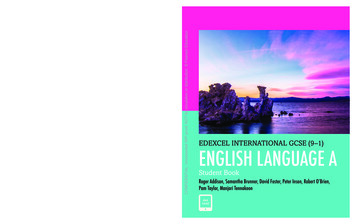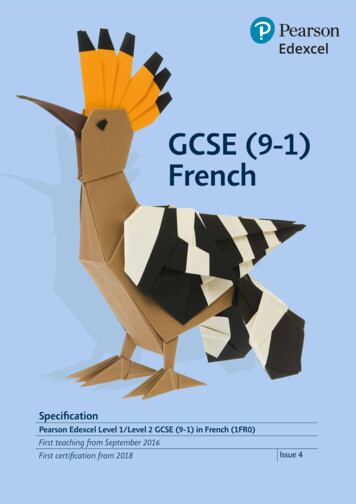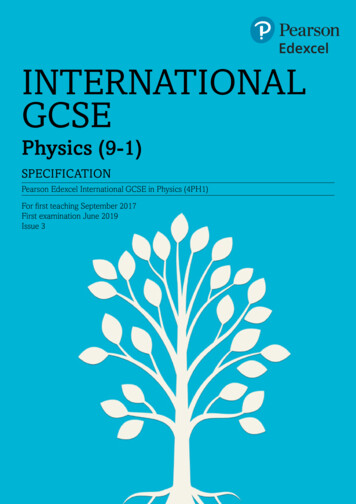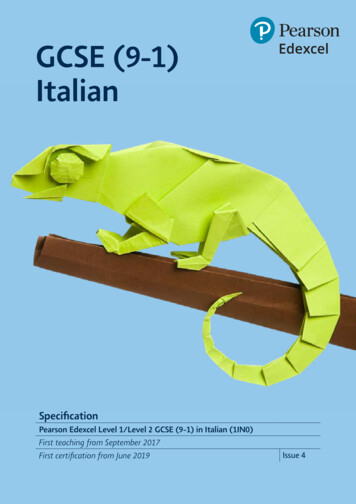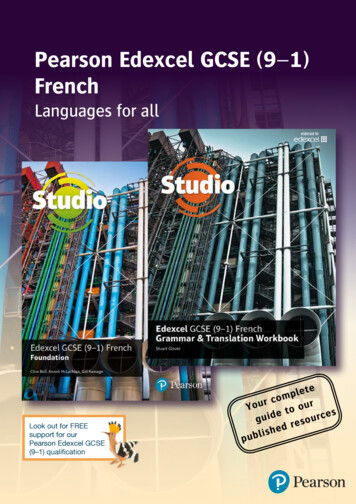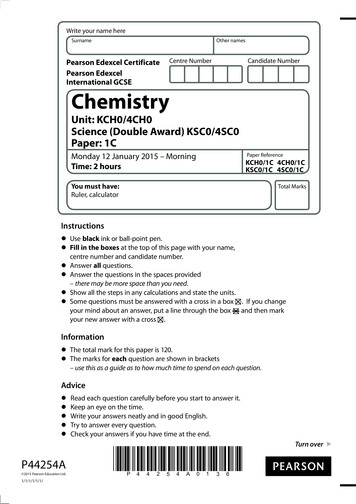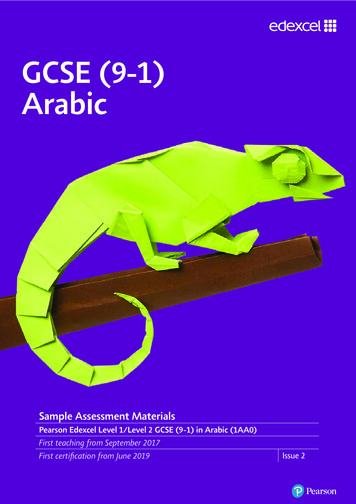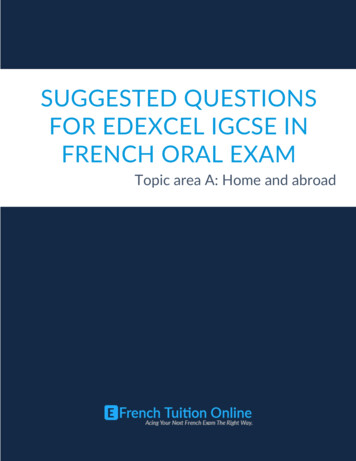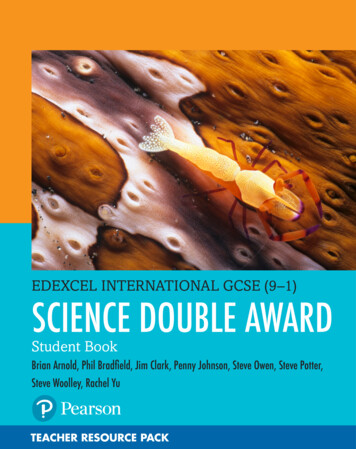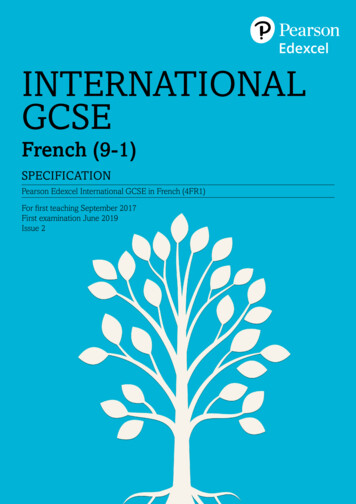
Transcription
INTERNATIONALGCSEFrench (9-1)SPECIFICATIONPearson Edexcel International GCSE in French (4FR1)For first teaching September 2017First examination June 2019Issue 2
Edexcel, BTEC and LCCI qualificationsEdexcel, BTEC and LCCI qualifications are awarded by Pearson, the UK’s largest awardingbody offering academic and vocational qualifications that are globally recognised andbenchmarked. For further information, please visit our qualifications website atqualifications.pearson.com. Alternatively, you can get in touch with us using the details onour contact us page at qualifications.pearson.com/contactusAbout PearsonPearson is the world's leading learning company, with 35,000 employees in more than70 countries working to help people of all ages to make measurable progress in their livesthrough learning. We put the learner at the centre of everything we do, because whereverlearning flourishes, so do people. Find out more about how we can help you and yourlearners at qualifications.pearson.comAcknowledgementsThis specification has been produced by Pearson on the basis of consultation with teachers,examiners, consultants and other interested parties. Pearson would like to thank all thosewho contributed their time and expertise to the specification’s development.References to third party material made in this specification are made in good faith. Pearsondoes not endorse, approve or accept responsibility for the content of materials, which maybe subject to change, or any opinions expressed therein. (Materials may include textbooks,journals, magazines and other publications and websites.)All information in this specification is correct at the time of going to publication.ISBN 978 1 446 93266 7All the material in this publication is copyright Pearson Education Limited 2020
Summary of Pearson Edexcel International GCSE in French(4FR1) specification issue 2 changesSummary of changes made between previous issue and this currentissuePagenumberSection Qualification at a glance has been reworded to present informationin a streamlined manner. There are no changes to the content.7–9In section 3.3 Preparation for the speaking test, explanations in parentheseshave been added to the following bullet points for further guidance:23The picture MUST contain the following elements: people (at least two people) objects (in the background) interactions (showing what people are doing).The list of prompts for the speaking test has been amended to match howthe information is presented in the sample assessment materials: Pourquoi (pas) ? – Why (not)? Autre chose ? – Anything else? C’est tout ? – Is that all?In the Grammar list, Verbs section, bullet points 4 and 5 have beenreworded in the following way for clarity: immediate/near future simple future2433If you need further information on these changes or what they mean, contact us via ourwebsite at: tml.
Contents1234About this specification1Introduction2Qualification aims and objectives3Why choose Pearson Edexcel qualifications?4Why choose Pearson Edexcel International GCSE in French?5Supporting you in planning and implementing this qualification6Qualification at a glance7French content11Course structure13Topics14Paper 1: Listening15Paper 2: Reading and Writing17Paper 3: Speaking23Grammar list33Assessment information35Assessment requirements35Assessment objectives and weightings36Relationship of assessment objectives to papers36Administration and general information37Entries37Access arrangements, reasonable adjustments, specialconsideration and malpractice37Awarding and reporting39Student recruitment and progression39Appendices41Appendix 1: Minimum core vocabulary list43Appendix 2: Codes88Appendix 3: Pearson World Class Qualification Design Principles89Appendix 4: Transferable skills91Appendix 5: Glossary93Appendix 6: Candidate cover sheet (Paper 3: Speaking)94
1 About this specificationThe Pearson Edexcel International GCSE in French is part of a suite of International GCSEqualifications offered by Pearson.This qualification is not accredited or regulated by any UK regulatory body.This specification includes the following key features.Structure: the Pearson Edexcel International GCSE in French is a linear qualification. Allunits must be taken at the end of the course of study.Content: relevant, engaging and up to date.Assessment: 100% external assessment.Approach: a foundation for students wishing to progress to further study of French atschools and colleges. Listening skills are assessed separately in Paper 1. Reading and writing skills are tested in separate exercises in Paper 2. Speaking communication skills are assessed separately in Paper 3. Assessment is in the June examination series. For the purposes of communication, topics relate to the interests of students studyingFrench, for example in study and leisure situations. Contexts and settings will be those that students are likely to encounter, for example atschool or in the media. Culturally sensitive and authentic texts are used throughout. Tests will measure achievement against many of the benchmarks of Levels A2 and B1 ofthe Council of Europe's Common European Framework of Reference for Languages:Learning, Teaching, Assessment (CEFR).Specification updatesThis specification is Issue 2 and is valid for the Pearson Edexcel International GCSEexamination from 2019. If there are any significant changes to the specification, Pearson willinform centres. Changes will also be posted on our website.For more information please visit qualifications.pearson.comUsing this specificationThis specification has been designed to give guidance to teachers and encourage effectivedelivery of the qualification. The following information will help you get the most out of thecontent and guidance.Compulsory content: as a minimum, all the bullet points in the content must be taught.The word ‘including’ in content specifies the detail of what must be covered.Assessments: use a range of material and are not limited to the examples given. Teachersshould deliver the qualification using a good range of examples to support the assessment ofthe content.Depth and breadth of content: teachers should use the full range of content and all theassessment objectives given in Section 2 French content.Pearson Edexcel International GCSE in French – SpecificationIssue 2 – July 2020 Pearson Education Limited 20201
IntroductionThe Pearson Edexcel International GCSE in French is designed for use in schools. It is part ofa suite of International GCSE qualifications offered by Pearson.The qualification is designed primarily for students who are studying French in order toenhance their future education or employment prospects.Achievement is broadly equivalent to Levels A2 and B1 of the CEFR. Students at this levelare expected to understand the main points of familiar matters regularly encountered inwork, school, leisure, etc., and can deal with most situations likely to arise while travelling inan area where the language is spoken. They can produce simple, connected text on topicsthat are familiar or of personal interest, and can describe experiences and events, dreams,hopes and ambitions, and briefly give reasons and explanations for opinions and plans.Students will be expected to communicate formally and informally in a range of contexts,and to understand a wide range of texts and styles.The aim of the qualification is to test French language competence through realistic andcontextualised tasks based on authentic texts.Speaking, listening, reading and writing skills are tested through three examination papers.2Pearson Edexcel International GCSE in French – SpecificationIssue 2 – July 2020 Pearson Education Limited 2020
Qualification aims and objectivesThe aims and objectives of this qualification are to enable students to develop: understanding and use of written forms of the target language, in a range of familiar andpractical contexts, and for a variety of purposes understanding and use of the spoken forms of the target language, in a range of familiarand practical contexts, and for a variety of purposes the ability to communicate effectively in the target language through the written word,using a range of vocabulary and structures the ability to communicate effectively in the target language through speaking, using arange of vocabulary and structures a knowledge and understanding of the target language grammar and its practicalapplication a knowledge and understanding of countries and communities where the target languageis spoken positive attitudes towards modern foreign language learning a suitable foundation for further study of the target language, or another language.Pearson Edexcel International GCSE in French – SpecificationIssue 2 – July 2020 Pearson Education Limited 20203
Why choose Pearson Edexcel qualifications?Pearson – the world’s largest education companyEdexcel academic qualifications are from Pearson, the UK’s largest awarding organisation.With over 3.4 million students studying our academic and vocational qualificationsworldwide, we offer internationally recognised qualifications to schools, colleges andemployers globally.Pearson is recognised as the world’s largest education company, allowing us to driveinnovation and provide comprehensive support for Pearson Edexcel students in acquiring theknowledge and skills they need for progression in study, work and life.A heritage you can trustThe background to Pearson becoming the UK’s largest awarding organisation began in 1836,when a royal charter gave the University of London its first powers to conduct exams andconfer degrees on its students. With over 150 years of international education experience,Edexcel qualifications have a firm academic foundation, built on the traditions and rigourassociated with Britain’s educational system.Results you can trustPearson’s leading online marking technology has been shown to produce exceptionallyreliable results, demonstrating that at every stage, Pearson Edexcel qualifications maintainthe highest standards.Developed to Pearson’s world-class qualification standardsPearson’s world-class standards mean that all Pearson Edexcel qualifications are developedto be rigorous, demanding, inclusive and empowering. We work collaboratively with a panelof educational thought leaders and assessment experts to ensure that Pearson Edexcelqualifications are globally relevant, represent world-class best practice and maintain aconsistent standard.For more information on the World Class Qualification process and principles please go toAppendix 3 or visit our website: uk.pearson.com/world-class-qualifications.4Pearson Edexcel International GCSE in French – SpecificationIssue 2 – July 2020 Pearson Education Limited 2020
Why choose Pearson Edexcel International GCSEin French?We have listened to feedback from all parts of the international school, UK independentschool and language teaching community. We have made changes that will engage studentsand provide opportunities to gain skills that will support progression to further study ofFrench, and to enhance future educational or employment prospects.Our French language qualification is specifically intended for students whose first language isnot French.The content and assessment approach for this qualification has been designed to meetstudents’ needs in the following ways.Topics – the topics (and related texts) used in the reading and writing paper are engagingand suitable for all students, are based on contexts that students are likely to encounter andare diverse in their content. Culturally sensitive and authentic reading and listening texts areused throughout.Student selected picture – students will select their own picture as part of the speakingexamination. This empowers the students to confidently prepare for a topic of their choice,and personalise one element of their examination.Clear and straightforward question papers – our question papers are clear andaccessible for all students of all ability ranges and learning styles. Our mark schemes arestraightforward, so that the assessment requirements are clear.Broad and deep development of skills – the design of the revised International GCSEaims to extend students’ knowledge by broadening and deepening skills, for examplestudents develop the ability to: read for both gist and detail write in response to a given situation listen to a complex argument or discussion, understand the overall message and identifyattitudes and opinions participate in extended discussion.Development of spoken language skills – students are able to develop theirunderstanding of the spoken word through separate speaking and listening components.Progression to A Level – International GCSEs enable successful progression to Level 3qualifications (such as the International A Level) and beyond, in French and other subjects.Through our world class qualification development process, we have consulted internationalFrench language teaching experts to validate this qualification and endorse its content, skillsdevelopment and assessment structure.Pearson Edexcel International GCSE in French – SpecificationIssue 2 – July 2020 Pearson Education Limited 20205
Supporting you in planning and implementing thisqualificationPlanning Our Getting Started Guide gives you an overview of the Pearson Edexcel InternationalGCSE in French to help you understand the changes to content and assessment, andwhat these changes mean for you and your students. We will give you a course planner and editable schemes of work, contactteachinglanguages@pearson.comTeaching and learning Our skills maps highlight opportunities for students to develop skills that are assessed, aswell as skills that are not directly assessed.Preparing for examsWe will also give you a range of resources to help you prepare your students for theassessments, including: specimen papers to use as formative assessment and for mock exams examiner commentaries following each examination series.ResultsPlusResultsPlus provides the most detailed analysis available of your students’ examperformance. It can help you to identify the topics and skills where further learning wouldbenefit your students.examWizardThis is a free online resource designed to support students and teachers with exampreparation and assessment.Training eventsIn addition to online training, we host a series of training events each year that giveteachers a deeper understanding of our qualifications.Get help and supportOur Subject Advisor service ensures that you receive help and guidance from us. You canemail our subject advisor at: teachinglanguages@pearson.com. You can also sign up toreceive the Edexcel languages e-updates to keep up to date with our qualifications and alliedsupport and service news.6Pearson Edexcel International GCSE in French – SpecificationIssue 2 – July 2020 Pearson Education Limited 2020
Qualification at a glanceQualification overviewThe Pearson Edexcel International GCSE in French consists of three externally examinedpapers.The Pearson Edexcel International GCSE in French is a linear qualification. All papers mustbe taken at the end of the course of study.Content and assessment overviewPaper 1: Listening*Paper code:4FR1/01Externally assessed25% of thequalificationWritten examination: 30 minutes, plus 5 minutes’ reading timeAvailability: June40 marksContent overviewThis paper assesses listening skills across five topic areas: Home and abroad Education and employment Personal life and relationships The world around us Social activities, fitness and health.Assessment overviewSeven questions, which are a combination of multiple-choice, multiple-matching,note-taking and gap-fill questions. All five topic areas are assessed.The listening audio files are available on our website.Pearson Edexcel International GCSE in French – SpecificationIssue 2 – July 2020 Pearson Education Limited 20207
Paper 2: Reading and Writing*Paper code:4FR1/02Externally assessed50% of thequalificationWritten examination: 1 hour 45 minutesAvailability: June80 marks (40 marks for reading and 40 marks for writing)Content overviewThis paper assesses reading and writing skills in separate sections across five topic areas: Home and abroad Education and employment Personal life and relationships The world around us Social activities, fitness and health.Assessment overview Section A: ReadingFive questions, which are a combination of multiple-choice, note-taking, gap-fill andshort-answer questions.Section B: WritingThere are two open-response writing tasks and a task that requires writing verbs in theircorrect forms. Each task in this section is linked to a specific topic area.8Pearson Edexcel International GCSE in French – SpecificationIssue 2 – July 2020 Pearson Education Limited 2020
Paper 3: SpeakingInternally conducted and externally assessedSpoken examination: 8–10 minutes*Paper code:4FR1/0325% of thequalificationAvailability: as timetabled for the June examination series40 marksContent overviewThis paper assesses speaking skills across five topic areas: Home and abroad Education and employment Personal life and relationships The world around us Social activities, fitness and health.Sub-topics A3, C3, C5, D2 and E4 will not be assessed in this paper(see Topics section for the list of sub-topics).Assessment overviewThe examination is made up of three tasks (A, B and C). Students will present and answerquestions on a picture that is related to one of the topic areas. They will also discuss twodifferent topics, chosen at random by Pearson.The assessments are conducted by teachers in one session within a prescribed assessmentwindow. The recordings are then submitted to Pearson for external marking.*See Appendix 2: Codes for a description of this code and all other codes relevant to thisqualification.Pearson Edexcel International GCSE in French – SpecificationIssue 2 – July 2020 Pearson Education Limited 20209
10Pearson Edexcel International GCSE in French – SpecificationIssue 2 – July 2020 Pearson Education Limited 2020
2 French contentCourse structure13Topics14Paper 1: Listening15Paper 2: Reading and Writing17Paper 3: Speaking23Grammar list33Pearson Edexcel International GCSE in French – SpecificationIssue 2 – July 2020 Pearson Education Limited 202011
12Pearson Edexcel International GCSE in French – SpecificationIssue 2 – July 2020 Pearson Education Limited 2020
Course structure The Pearson Edexcel International GCSE in French comprises three papers. The Pearson Edexcel International GCSE in French is a linear qualification. All units mustbe taken in the terminal series at the end of the course of study.Pearson Edexcel International GCSE in French – SpecificationIssue 2 – July 2020 Pearson Education Limited 202013
TopicsTopicSub-topicsA. Home and abroad1 Life in the town and rural life2 Holidays, tourist information anddirections3 Services (e.g. bank, post office)*4 Customs5 Everyday life, traditions and communitiesB. Education and employment1 School life and routine2 School rules and pressures3 School trips, events and exchanges4 Work, careers and volunteering5 Future plansC. Personal life and relationships1 House and home2 Daily routines and helping at home3 Role models*4 Relationships with family and friends5 Childhood*D. The world around us1 Environmental issues2 Weather and climate*3 Travel and transport4 The media5 Information and communicationtechnologyE. Social activities, fitness and health1 Special occasions2 Hobbies, interests, sports and exercise3 Shopping and money matters4 Accidents, injuries, common ailments andhealth issues*5 Food and drink*Sub-topics A3, C3, C5, D2 and E4 will not be assessed in Paper 3: Speaking14Pearson Edexcel International GCSE in French – SpecificationIssue 2 – July 2020 Pearson Education Limited 2020
Paper 1: ListeningExternally assessed1.1IntroductionListeningStudents are required to convey their understanding of spokenFrench through a series of listening tasks.Students must be able to: identify and note main points deduce the meaning of words from context extract specific details identify points of view show some understanding of unfamiliar language recognise attitudes, emotions and opinions.This paper will feature questions drawn from a variety of sources,which all relate to the topics. These sources should be consideredas different contexts in which students can write and understandFrench. Specialist and/or technical French vocabulary or detailedspecialist knowledge of the topics are not required.Pearson Edexcel International GCSE in French – SpecificationIssue 2 – July 2020 Pearson Education Limited 202015
1.2ContentListeningThe listening examination lasts 30 minutes and is worth a quarter(25%) of the qualification. It consists of 40 marks.This paper will consist of seven tasks, each based on a singlerecorded text.Students will be given five minutes to read the questions beforethe paper begins and will be expected to respond to the questionsas they listen.Students will hear each text twice.Recorded texts may be in the form of short statements,monologues and dialogues between two or three speakers. Wherethere is more than one speaker, the identity of each speaker willbe clearly signposted.Recordings and tasks will always be contextualised and, whereappropriate, a purpose for the task will be identified.The topics of the listening texts will be taken from a range ofdifferent situations, from both everyday life and academic contextswith which students will be familiar. One task type may be usedwith each listening text.Correct spelling and grammatical accuracy will not be arequirement as long as the student’s response is comprehensible.The examination will begin with shorter statements, which buildinto short paragraphs and longer conversations. Task typesdemand a variety of input from students and includemultiple-choice, multiple-matching, note-taking, table-completionand gap-fill questions.16Pearson Edexcel International GCSE in French – SpecificationIssue 2 – July 2020 Pearson Education Limited 2020
Paper 2: Reading and WritingExternally assessed2.1IntroductionReadingStudents are required to convey their understanding of writtenFrench through a series of reading tasks.Students must be able to: identify and note main points deduce the meaning of words from context extract specific details identify points of view show some understanding of unfamiliar language recognise attitudes, emotions and opinions.This section will feature questions drawn from a variety of sourcesthat all relate to the topics. These sources should be considered asdifferent contexts in which students can write and understandFrench. Specialist and/or technical French vocabulary or detailedspecialist knowledge of the topics are not required.Writing andgrammarStudents need to draw on their knowledge of French language,grammar and lexis in selecting appropriate forms of words tocomplete sentences, and demonstrate an ability to manipulateFrench language in continuous writing. As part of theirInternational GCSE, students should undertake regular writingactivities.This section will require students to: write for a variety of audiences, such as friends andacquaintances, teachers, family members, groups andprofessional bodies write using a wide range of grammatical forms and structures write using a wide range of relevant and appropriatevocabulary.Pearson Edexcel International GCSE in French – SpecificationIssue 2 – July 2020 Pearson Education Limited 202017
2.2ContentReadingStudents should spend approximately 52 minutes of the 1-hourand 45-minute exam on this section, which is worth 50% of thepaper and 25% of the qualification. It consists of 40 marks.This section will consist of five tasks, each based on a collection ofshort texts or a longer single text.The literary text consists of a short extract from a text that mayhave been adapted and abridged from authentic sources to beappropriate to this level – from letters, short stories, novels orplays to contemporary and historical sources.Students will be required to read a range of authentic factual andnon-factual written material of varying length, in differentregisters and contexts, and from different sources. These mayinclude advertisements, short passages, letters, informationleaflets, faxes, emails, website pages, newspaper and magazinearticles and literary texts.Stimuli and tasks will always be contextualised and, whereappropriate, a purpose for the task will be identified.The topics of the stimulus texts will be taken from a range ofsituations, from both everyday life and academic contexts withwhich students will be familiar. A different task type may be usedwith each stimulus text.The questions will require a combination of non-verbal responsesand answers in French. In order to answer the questions, studentswill need to use a range of reading techniques such as skimming,scanning and in-depth reading for details. Grammatical accuracywill not be assessed in this section of the paper.Correct spelling will not be a requirement as long as the student’sresponse is comprehensible.Task types demand a variety of input from students and includemultiple-choice, multiple-matching, note-taking, table-completion,gap-fill and short-answer questions.WritingStudents should spend approximately 52 minutes of the 1-hourand 45-minute exam on this section, which is worth 50% of thepaper and 25% of the qualification. It consists of 40 marks.This section will consist of two writing tasks and a thirdgrammar-based task.The first writing task is short, and the student will be asked to write60–75 words, including four prescribed words or short phrases.The second writing task is longer than the first and contains anelement of choice. The student will be able to choose from threequestions that are drawn from different topics, and they will needto write between 130 and 150 words in response to the question,addressing four bullet points.18Pearson Edexcel International GCSE in French – SpecificationIssue 2 – July 2020 Pearson Education Limited 2020
In the third grammar-based task students will be asked to changethe words in brackets so that they correctly fit the sentences. Thiswill involve the need to manipulate, for example, verbs andadjectives, into their correct word form.Grammatical accuracy, punctuation and spelling will be assessed inthis section of the paper.Pearson Edexcel International GCSE in French – SpecificationIssue 2 – July 2020 Pearson Education Limited 202019
2.3Assessment criteria for WritingQuestion 6MarkCommunication and content (AO3)0No rewardable material.1 Isolated examples of relevant information. Only isolated words and phrases are communicated, as appropriate to the task. Only isolated items are comprehensible.2 The response contains little relevant information, with limited use of detail. Theremay be repetition. Expresses simple ideas and opinions, as appropriate to the task. Just about comprehensible overall but with sentences that are mostly unconnected.3 The response contains some relevant information, with occasional use of detail. Begins to show ability to express ideas and opinions and to describe or inform, asappropriate to the task. Coherent overall but logical flow and sequence of ideas is intermittent, whichimpedes clarity.4 Some detail and mostly relevant response to the task. Shows some evidence of ability to express ideas and opinions and to describe orinform, as appropriate to the task. Coherent with logical flow and sequence of ideas, though there may be some lapses.5 Detailed and fully relevant response to the task. Shows a clear ability to express ideas and opinions and to describe or inform, asappropriate to the task. Coherent with logical flow and sequence of ideas.20Pearson Edexcel International GCSE in French – SpecificationIssue 2 – July 2020 Pearson Education Limited 2020
MarkLinguistic knowledge and accuracy (AO3)0No rewardable language.1 Isolated examples of target language vocabulary and structures. Uses very basic language to write words and phrases. Isolated examples of accurate language.2 Uses very familiar and predictable vocabulary and structures, often repetitive. Uses simple, familiar and predictable language to write short sentences or phrases. Occasional correct phrases but frequent misspellings, inaccurate genders andincorrect verb forms.3 Uses familiar and predictable vocabulary and structures. Some evidence of manipulation of language to produce sentences but this is notsustained. Sometimes accurate in using straightforward language but there are major errorswith verbs and tenses.4 Tends towards use of familiar and predictable vocabulary and structures. Some evidence of manipulation of language to produce sentences. Mostly accurate with some minor errors, e.g. spellings, genders and agreements.Occasional major errors, e.g. with verbs and tenses.5 Uses a range of vocabulary and grammatical structures. Language manipulated to produce fluent sentences. Very accurate with only isolated minor errors, e.g. spellings, genders and agreements.Pearson Edexcel International GCSE in French – SpecificationIssue 2 – July 2020 Pearson Education Limited 202021
Question 7MarkCommunication and content (AO3)0No rewardable material.1–2 The response shows minimal ability to express ideas relevant to the narrative,report or description required, and ideas hardly follow a logical sequence. The response is rarely coherent and there is so much digression that the overalltheme or purpose of the piece is greatly obscured.3–4 The response shows some basic ability to express ideas in a form that would becomprehensible to a sympathetic native reader, with only occasional evidence ofideas following a logical sequence. The resp
The Pearson Edexcel International GCSE in French is part of a suite of International GCSE qualifications offered by Pearson. This qualification is not accredited or regulated by any UK regulatory body. This specification includes the following key features. Structure: the Pearson Edexcel International GCSE in French is a linear qualification. All
